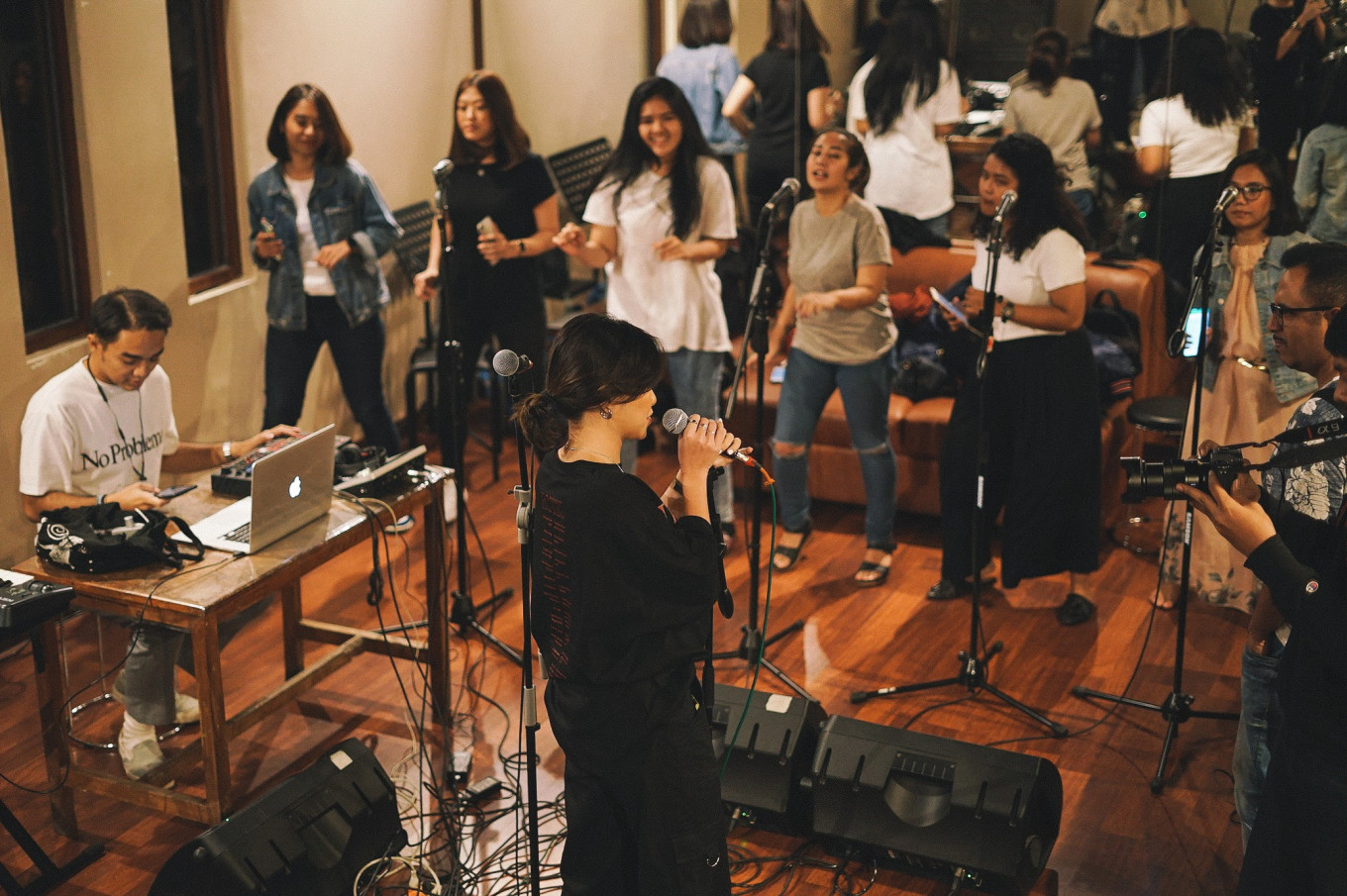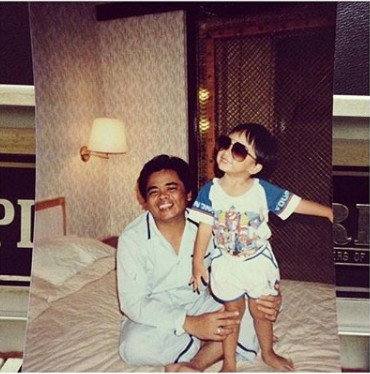Popular Reads
Top Results
Can't find what you're looking for?
View all search resultsPopular Reads
Top Results
Can't find what you're looking for?
View all search resultsDJ Dipha Barus: Imbuing music with life, life with music
As befitting a musical Midas, every song he releases becomes all the rage. But unlike the mythical Greek king, Dipha's prowess derives from his passion to understand life and his belief in humankind.
Change text size
Gift Premium Articles
to Anyone
I
t could be the way Dipha Barus introduces himself as “fully human” that has made him an antithesis to the “young and famous”stereotype: He is someone who lives according to the deeper meaning of “you only live once”.
But there is, of course, much more to the Indonesian DJ and music producer.
He has a vast curiosity for anything happening under the sun. From fashion to architecture, from the emerging field of epigenetics to traditional medicine, as well as all the trades involved in making and producing music, he finds all this and more intriguing.
“I just looked up on YouTube the health benefits of coconut this morning and I found a post on the benefits of bathing in yellow coconut water. So, I just tried [that] earlier,” Dipha said in a recent video interview with The Jakarta Post.
This seems to indicate that Dipha does his research and then tries it right away, instead of lounging around just thinking about something that has captured his interest.
Living away from the urban hustle and bustle in Bali with his wife Vanessa Budihardja, as well as a pet cat, the winner since 2016 of Indonesia’s top music award, Anugerah Musik Indonesia (AMI), and the holder of the “DJ of the Year” title in 2014 and 2018 has kept himself busy with a digital audio workstation at home.
On Sept. 29, he released a remix of “Love We’ll Find” by Singaporean musician JUN (formerly known as MMXJ), adding dance beats and Indian folk music. The week before, he released “Down (VIP Remix)”, a dance/club version of his own collaboration with American R&B singer CADE under Ultra Music.
Based in New York, Ultra Music is the leading record label for electronic dance music (EDM), a genre that developed in the 1980s, and has signed on industry big names like Steve Aoki, David Guetta, Avicii and Tiësto.
The original song, which featured rindik, the Balinese bamboo xylophone, was released in mid-August. It went viral and gained even more exposure after he created the #DownChallengepage on TikTok and invited people to make videos of themselves dancing or exercising to his music.
Born Dipha Kresna Aditya Barus and raised a Jakartan, the 34-year-old was introduced to music the second he was born, as his father had insisted on playing Louis Armstrong’s “What A Wonderful World” in the delivery room. It was also his father who taught him how to play the piano as a child.
Dipha then took music classes at a variety of popular music schools, but quit before he mastered any instrument. Nevertheless, he became a session musician playing bass for a band when he was still in elementary school.
Grounded: Young Dipha is in the picture with his late father, church curate Johan Barus (photo left), and mother Susilawati Sembiring. His parents exposed Dipah to music from literally the day he was born. (Moses Sihombing/-)He wrote songs and sold them to bands when he was in junior high school, which laid out a path to a professional career in music. But his parents wanted him to do something else and keep music a hobby.
So Dipha studied graphic design and worked with an advertising firm in Malaysia. He quit and returned home for good in 2008 after his father passed away, to take up the role of breadwinner and look after his mother and younger brother.
He hasn’t stopped since. He worked in a bookstore, offered his services to make playlists for restaurants and joined electronic music band Agrikulture as an extra. But he hadn’t yet landed a job as a DJ.
New passion
Dipha was in his teens when a much older cousin took him to an underground party at a warehouse in Singapore. It was his first time clubbing and it was there that he was exposed to the live DJing. Only one performer was on the stage playing drum and bass (DnB), a subgenre of EDM that was popular in the early 2000s.
“I was not of legal age to be in a club, but no one was checking IDs,” he recalled. “I remember feeling pretty amazed by the music, how so many people reacted to music that was arranged simply and started to dance.”
He fell for EDM long before the global wave and started collecting albums of the genre’s bands, like The Prodigy and Primal Scream. He then learned how to make a tracklist from sflogicninja, the YouTube channel of San Francisco-based composer and remixer David Earl that was created in 2006.
Dipha got his first job as a semi-resident turntablist at a Malaysian club in during his final year in college. And then, after being rejected multiple times by Jakarta clubs that called his music “idealistic”, he finally got a chance DJing for Agrikulture and landed a job as a resident DJ at a club in Bali.
In 2015, he took a holiday to Yogyakarta where he stayed at the home of his childhood friend, fashion designer Kleting Titis Wigati, whose entrepreneurial sister, Teges Prita Soraya, was acquainted with traditional musicians.
“I recorded the sounds of each instrument for the next song I made, and I still use them in my songs to this day,” said Dipha.
His 2016 single, “No One Can Stop Us” featuring Kallula, is rich with the sounds of the gamelan and the music of Acehnese dances. It received kudos as “the anthem of Indonesian youth” from senior musicians Guruh Soekarnoputra and (the late) Yockie Suryoprayogo in Sounds From the Corner’s “Taste Test” on YouTube, who picked up on Dipha’s efforts to arrange Indonesian musical sounds in harmony with the vocals.
“While dissecting my music, they actually describe my musical style and were the first to recognize it,” Dipha said.
“I don’t use Indonesian sounds just for the sake of it or because of blind nationalism, but because it’s easier to get my hands on them,”he noted. “I’m currently exploring the music of the Batak Karo ethnic group, which I come from. I’m not doing it just because it’s my ancestral culture, but the mystical sound it produces fascinates me.”
His interest in a wide range of musical genres has allowed him to collaborate with many artists of different musical genres from pop to R&B, and from hip hop to dangdut.
“I’m a big fan of Rhoma Irama, especially his music in the 1970s,”said Dipha, referring to the “King of Dangdut”.
“We met and I visited his studio for an hour to learn more about the music, the groove. And that’s how I construct the music. Not by layering dangdut music on top of modern music, but by finding similarities in beats and frequency and working on it from there.”
Although his father introduced him to the world’s music legends, it was his cousin, music expert and cofounder of the Irama Nusantara archive of Indonesian music, David Tarigan, who opened his ears to the diverse, erstwhile sounds of Indonesia’s popular music.
“He once told me that if I could bridge the younger generation and Rhoma Irama’s generation, I would be a game changer. So, I took on the challenge,” said Dipha.
Stage persona
The self-taught composer has faced many challenges in his life, including surviving a road accident that left him in a coma for days, a daylight mugging and drug abuse. He has studied martial arts, meditation and sound healing to address his trauma, and has become a vegan, keeping a scale within reach to count his macronutrients.
His achievements testify to his beliefs in a purposeful universe and the power of manifestation. Dipha had long wanted to become a DJ, produce music for other artists and to make music that “spoke” to its listeners.
“I played Banda Aceh in 2017 on a stage in a pine forest with Lhoknga Beach in the background. I didn’t expect much, but it turned out everyone in the audience knew my song and they sang along. I was moved,” he recalled his experience in the capital of Aceh, which is known for being the most conservative city in the province.
He added that some listeners told him that listening to his music helped restore their will to live or encouraged them to give club music a chance.
With such accomplishments, all that’s left on his “manifestation list”is winning a Grammy, which might not be a stretch. After all, he was invited to the Grammys after party in January and in July, he played at the online charity gig of the Recording Academy that organizes the Grammy Awards.
It could be said that Dipha’s music is a blend of everything he is passionately curious about, but also reflects his interests.
“I’m fascinated by architectural structures that [emphasize] the occupant in the design. It’s similar to making music, assembling all the elements while thinking about the character of the performers [...],” said Dipha, who is a self-professed fan of the self-taught Japanese architect, Tadao Ando.
His persona, both on and off stage, is also reflected in his sartorial style that tends toward the sleek street style of Japanese brand Comme des Garçons and designer Yohji Yamamoto, who chose classic dangdut as the soundtrack for his runway show during 2012 Paris Fashion Week.
“I really love fashion and the designers’ sense about the people who wear [their clothing]. And indeed, music and fashion always goes hand in hand.”
His dynamic thought stream also brought up the idea of establishing a music school for traditional musicians, who have been among those hit hardest by the COVID-19 epidemic.
“Musicians have to move forward together. Otherwise, we will not be part of the solution,” he added.
Despite his popularity, Dipha is not one to shy away from embracing his own failures.
“The mistakes we make are our biggest [motivation] for moving forward. [What is] important in life is to realize that it’s not about being superhuman, but that being human is super,” he said, quoting his spiritual mentor, Jaggi Vasudev, who goes by the moniker “Sadhguru”.
“I don’t have the answer when people ask me how to make a song popular. All I know is how to make a song, and that I have to stay in the process [from beginning to end].”












